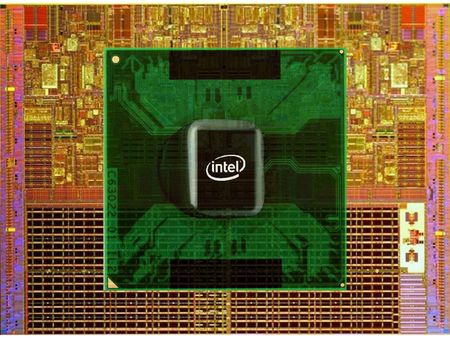Intel's 15 Most Unforgettable x86 CPUs
The First Mobile Dual-Core
In 2006, Intel announced the Core Duo. The first dual-core processor for portable PCs boasted excellent performance—much better than the Pentium 4. It was also one of the first x86 processors to be truly dual-core. The cache, for example, is shared (whereas the Pentium D was more like an assembly of two processors in the same package). This processor was part of the Centrino Duo platform and was a huge success. The only drawback was that it was still a 32-bit processor, unlike the Pentium 4.
| Code name | Yonah |
| Date released | 2006 |
| Architecture | 32 bits |
| Data bus | 64 bits |
| Address bus | 32 bits |
| Maximum memory | 4 GB |
| L1 cache | 32 KB + 32 KB |
| L2 cache | 2,048 KB shared |
| Clock frequency | 1.06–2.33 GHz |
| FSB | 667 MHz |
| SIMD | MMX, SSE, SSE2, SSE3 |
| SMT/SMP | Dual core |
| Fabrication process | 65 nm |
| Number of transistors | 151 million |
| TDP | 9-31 W |
| Voltage | 0.9–1.3 V |
| Die surface area | 91 mm² |
| Connector | Socket 479 |
A Core Solo version with one core was also made available, and the low-power-consumption versions used a 533 MHz bus (133 MHz QDR) instead of 667 MHz. This processor was used in servers (code name Sossaman), which was a first for a processor originally intended for the mobile world. Note that this processor didn’t officially use the Core architecture of the Core 2 Duo, and it was quickly replaced by the Core 2 Duo (Merom) in portable PCs. Also, the Yonah’s Socket 479 is different from the Socket 479 of other Pentium M processors.
Get Tom's Hardware's best news and in-depth reviews, straight to your inbox.
Current page: The First Mobile Dual-Core
Prev Page Pentium 4 Gets 64-bit And Another Core Next Page Today's Hotness: The Core 2 DuoTom's Hardware is the leading destination for hardcore computer enthusiasts. We cover everything from processors to 3D printers, single-board computers, SSDs and high-end gaming rigs, empowering readers to make the most of the tech they love, keep up on the latest developments and buy the right gear. Our staff has more than 100 years of combined experience covering news, solving tech problems and reviewing components and systems.
-
Arkz great article with only a few slight errors (like saying the core2duo has 1-4 cores... i don't think there's a 1 cored version lol)Reply
Looking forward to the AMD article. -
aleluja To correct you. Core 2 Duo has ONLY 2 cores, not more, not less.Reply
Core 2 Quad, has 4 cores and Core Solo has 1 core.
-
@ArkzReply
Yes there is a singal core,
http://en.wikipedia.org/wiki/List_of_Intel_Core_2_microprocessors#Single-Core_Mobile_processors
Ok it is not under the same branding but it is part of the same microarchitecture -
-Fran- I might be wrong, but i resemble that the Pentium 166 (32bits adress bus and all) had support for 4Gb of memory. I remember IBM sold it's top line (at that time) with 64Mb support (even with SDR PC100/66 support). Correct me if i'm wrong please.Reply -
neiroatopelcc The core 2 does supply 1-4 cores - 2 cores per die, where one might be disabled, and one or two dies on a socket. It's no less right to call a core2duo a cpu with 1-4 cores, than it is to put the pentium d on the same page as a single core prescot, as it's the very same principle.Reply -
cangelini Arkzgreat article with only a few slight errors (like saying the core2duo has 1-4 cores http://en.wikipedia.org/wiki/Coree ... i don't think there's a 1 cored version lol)Looking forward to the AMD article.Reply
Thanks for the heads-up! I tweaked that passage to better represent the Core 2 architecture's available configurations! -
randomizer vosesterOk it is not under the same branding but it is part of the same microarchitecture Exactly. The article says:Reply
ArticleThere are many versions of the architecture, resulting in configurations with a different number of cores
There is no mention of the branding, so there is no actual error there, just misinterpretation. -
ImSpartacus Arkzgreat article with only a few slight errors (like saying the core2duo has 1-4 cores... i don't think there's a 1 cored version lol)Looking forward to the AMD article.Reply
http://www.newegg.com/Product/Product.aspx?Item=N82E16819116039
Yes, it isn't called a "Core 2 Duo," but it uses the Core architecture and only has a single core enabled.
But I will have to say, there aren't any 3 core models... -
magicandy Good to hear you're not only doing an AMD article, but an ATI one as well (in response to the Nvidia article you did earlier, assuming). A sign of class from the new Tom's is a welcome one.Reply -
harrycat88 I wish they would get rid of those stupid SNAP Linkbubless and Inteltex misguiding links. Who ever invented those stupid annoying double lined text popups should have been burned at the stakeReply

